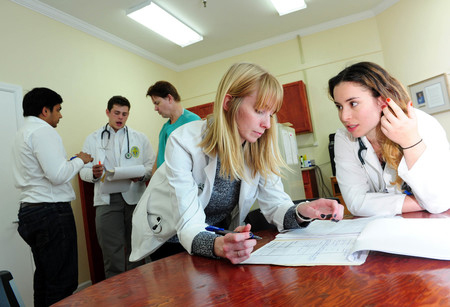
Mission
We improve human health and foster healthy communities through discovery and translation of the best science into clinical practice and education; to deliver the highest quality patient care and prepare the next generation of distinguished clinical and scientific leaders.
Vision
To be a distinctive, preeminent research-intensive medical school, transforming health through discovery, lifelong learning, and patient-centered health care.
Core Values
- Accountability
- Compassion
- Quality
- Collaboration
- Integrity
- Diversity
- Creativity
One of the nation's most recognized centers for medical education, Tulane University School of Medicine is a vibrant center for education, research and public service. Celebrating its 175th anniversary in 2009, Tulane School of Medicine is the second-oldest medical school in the Deep South and the 15th oldest medical school in the United States. Follow this link to read more about Tulane School of Medicine's Core Values
Tulane School of Medicine recruits top faculty, researchers and students from around the world, and pushes the boundaries of medicine with groundbreaking medical research and surgical advances. From invention of the binocular microscope to robotic surgeries, Tulane School of Medicine remains at the forefront of modern medical innovation. Tulane School of Medicine is equipping the next generation of medical professionals with the tools to succeed in a rapidly changing world and shape the future of health care. On a daily basis, we strive to meet our mission of "Education, Research and Patient Care: We Heal Communities."
Tulane School of Medicine is fully accredited by the Liaison Committee on Medical Education.
Institutional Educational Program Objectives
- Patient Care
- Knowledge for Practice
- Practice-based Learning and Improvement
- Interpersonal and Communication Skills
- Professionalism
- Systems-based Practice
- Interprofessional Collaboration
- Personal and Professional Development
- Community Engagement and Service
Click to open a new page with the details of the Educational Program Objectives OR
Click on this Educational Program Objectives PDF link for ease of printing.
The Beginning
New Orleans, located in a subtropical climate and with one of the busiest international ports in the world, was vulnerable to all types of virulent infectious diseases in 1834. When the Medical College of Louisiana published its prospectus that same year, key among its objectives was "to lead the advancement of science and the rational treatment of disease." Follow this link to learn more about Tulane School of Medicine's Early Days
By 1845, the state legislature recognized the value of the institution and authorized a full-fledged university in New Orleans. The medical complex was quickly recognized as one of the largest medical schools in the country. By 1860, enrollment had increased to more than 400 students, positioning it as the fourth largest program for medical education in the nation.
In 1882, Paul Tulane donated extensive real estate in New Orleans for the support of education. The Board of Administrators of the Tulane Educational Fund decided to support the University of Louisiana, and by 1883 the Legislature of Louisiana passed a bill creating the Tulane University of Louisiana, a private, nonsectarian university. As part of Tulane University, the medical school continued to thrive and expand, moving into the 20th century as the top ranking medical school in the South and one of the best in the nation.
Discovery and Translation
Tulane School of Medicine distinguished itself in discovery and translation as well as in education. In 1932, Dr. Michael E. DeBakey graduated from Tulane School of Medicine and began a distinguished career in cardiovascular surgery. As a medical student, he researched and designed the roller pump, which became an essential component of the heart-lung machine that lead to open-heart surgery.Follow this link to learn more about Tulane School of Medicine's early pioneers and their accomplishments
Other Tulane faculty members who made enduring advances in medicine over the last century are Dr. Robert Heath in psychopharmacology, Dr. George E. Burch in physiology, Dr. Andrew V. Schally in endocrinology, and Dr. Louis J. Ignarro in pharmacology, the latter two winning Nobel Prizes for their work at Tulane.
Hurricane Katrina
In late August 2005, with Tulane School of Medicine on the cusp of major programmatic expansion, the worst natural disaster in the history of the United States caused unbelievable destruction to the city of New Orleans, its people and institutions, including Tulane University.Follow this link to read more about Tulane School of Medicine's struggles and resilience after Hurricane Katrina.
Tulane doctors stayed with their patients at Tulane Hospital, Charity Hospital, and the New Orleans VA hospital until forced to evacuate. Those doctors, students and residents would soon return to the city, establishing clinics in new locations and reestablishing access to both medical care and medical education.
In the aftermath of the storm, Tulane School of Medicine evacuated to Baylor College of Medicine in Texas, where medical students resumed their studies. Tulane medical school administrators coordinated the school's return to New Orleans, which began in November 2005 and accommodated the 98.5% of Tulane's medical students who remained with Tulane after Hurricane Katrina. Over the ensuing year, the dedicated and committed faculty reconstituted vigorous research and teaching programs as space became habitable.
Moving Forward
Tulane School of Medicine has established itself as a vital component in the renewal of one of America's greatest cities. We train the most qualified students to be capable, compassionate physicians who will provide high quality primary or specialty care locally, nationally and globally.
